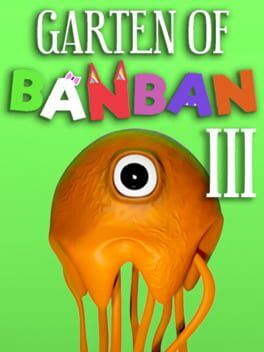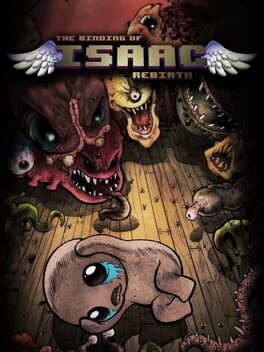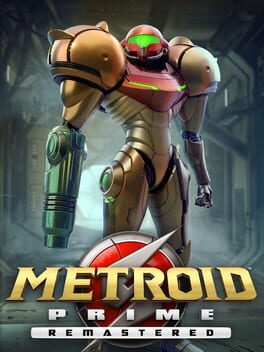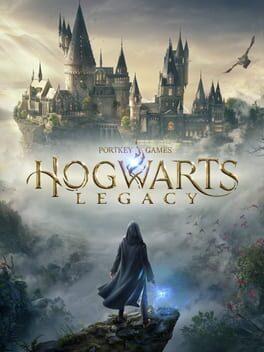FranzMagitek
556 Reviews liked by FranzMagitek
Garten of Banban 3
2023
Garten of Banban
2023
Garten of Banban
2023
I played this bullshit while getting spammed Better Call Saul riffs, Laura Palmer screams and a miriad of other funny meme sounds at x10 the sound they should play, I got so fucking dissoriented I thought I was going to have a panic attack. All just to get the intended experience by the devs: A child who still hasn't learned how to read, has been left alone by their parents and is still susceptible to the sweet release of an epileptic fit.
This is what stimulates your cousin for 14 hours straight every single day. Actual hell on earth.
This is what stimulates your cousin for 14 hours straight every single day. Actual hell on earth.
Viewtiful Joe 2
2004
"Wow, el primer Viewtiful Joe fue increíble, no puedo esperar a ver qué nuevos jefes, escenarios, puzzles, habilidades y enemigos me esperan en el segundo juego"
Literalmente Viewtiful Joe 2:
https://files.catbox.moe/t92frf.mp4
Literalmente Viewtiful Joe 2:
https://files.catbox.moe/t92frf.mp4
Abzu
2016
Imagine just playing the game and then out of nowhere in one of the last areas thE ANOMALOCARIS SHOWS UP WOOOOOOOOOOOOOOOOOOOOOOOOOOOOOOOOOOOOOOO LET'S FUCKING GOOOOOOOOOOOOOOOOOOOOOOOOOOOOOOOOOO YEAAAAAAAAAAAAAAAAAAAAAH THAT'S WHAT'S ALL ABOUT BABY FUCKING ANOMALOCARIS WOOOOOOOOOOOOO
.......cough.... sorry about that....
Even tho I have yet to play it, it isn't lost on me that after Journey's release, a lot of games followed its steps and tried to be a similar, contemplative experience, with mixed results in some cases, to say the least. Abzu is clearly no exception, this time putting is focus on a underwater setting, and if it one of the objectives was showing off its prettiness, by golly does it deliver it in spades.
Abzu's oceanic landscapes are nothing short of beautiful, magical, even. Swimming across these color filled areas, surrounded by a seemingly never-ending fauna, discovering the small secret zones and letting yourself be guided by these creatures that sometimes it's hard to believe they are real it's by far the best part of the experience, to just immerse (I swear I'm not doing this on purpose) in this little watery world, chill and relax as it sinks in, in that regard, in showing you pretty stuff and amazing set pieces, that is when Abzu shines.
But that's all it is, ''pretty'', and I can't shake off the feeling that its own contemplative nature gets in its own way. This a world overflowing with life, and yet, your interactions with it are the so few its comical. I have made it clear plenty of times that I don't have any problems when a game has only a handful of mechanics, hell, one of my favorite games is a ''walking simulator'', but in Abzu's case, being only able to swim , press a button on certain spots and meditate on some statues it’s just not enough, not considering what the game is showing me. I'm supposed to be saving this sea, and yet I just feel like I'm following a line, repeating the same actions in the same order until a secluded area becomes pretty to look at again, and it isn't until the final zones where I start to notice that the sea is in any real danger. Up until that point I was... doing what the game wanted me to do, the areas were still pretty, yes, but it just feels like I’m watching an aquarium, not really being in the same space as everything else. I was still being amazed by some things, like swimming alongside gigantic whales or rediscovering prehistoric life, but I just felt like a spectator, and that shouldn't be a bad thing, but the story seems to imply otherwise.
The game introduces a ton of elements, like ancient temples and a futuristic civilization that is destroying this world, and these are cool ideas in paper, but not they only really achieve their full potential or even appear just before the game ends. I get and really respect what they were going for, but it's poorly communicated, it clashes extremely hard with what it's shown to us and as such, it fails to give any sense of urgency, and makes its environmental message hit much less that it otherwise could have.
The ending is a cool final set piece, yes, and the music is fantastic, that too, but it just seems like the game tied its own hands in a lot of regards. It's still beautiful only because the sea itself is beautiful , and we should care for that beauty, one that slowly disappearing because of human action, and the game wants to join that conversation, but it doesn't seem to have the courage to really do it and be its own thing, and that's perhaps the worst about, that it seems content to be pretty and have cool set pieces, it doesn't aspire to be something greater.
Then again.... there are Anomalocaris, so it has its ups too.
.......cough.... sorry about that....
Even tho I have yet to play it, it isn't lost on me that after Journey's release, a lot of games followed its steps and tried to be a similar, contemplative experience, with mixed results in some cases, to say the least. Abzu is clearly no exception, this time putting is focus on a underwater setting, and if it one of the objectives was showing off its prettiness, by golly does it deliver it in spades.
Abzu's oceanic landscapes are nothing short of beautiful, magical, even. Swimming across these color filled areas, surrounded by a seemingly never-ending fauna, discovering the small secret zones and letting yourself be guided by these creatures that sometimes it's hard to believe they are real it's by far the best part of the experience, to just immerse (I swear I'm not doing this on purpose) in this little watery world, chill and relax as it sinks in, in that regard, in showing you pretty stuff and amazing set pieces, that is when Abzu shines.
But that's all it is, ''pretty'', and I can't shake off the feeling that its own contemplative nature gets in its own way. This a world overflowing with life, and yet, your interactions with it are the so few its comical. I have made it clear plenty of times that I don't have any problems when a game has only a handful of mechanics, hell, one of my favorite games is a ''walking simulator'', but in Abzu's case, being only able to swim , press a button on certain spots and meditate on some statues it’s just not enough, not considering what the game is showing me. I'm supposed to be saving this sea, and yet I just feel like I'm following a line, repeating the same actions in the same order until a secluded area becomes pretty to look at again, and it isn't until the final zones where I start to notice that the sea is in any real danger. Up until that point I was... doing what the game wanted me to do, the areas were still pretty, yes, but it just feels like I’m watching an aquarium, not really being in the same space as everything else. I was still being amazed by some things, like swimming alongside gigantic whales or rediscovering prehistoric life, but I just felt like a spectator, and that shouldn't be a bad thing, but the story seems to imply otherwise.
The game introduces a ton of elements, like ancient temples and a futuristic civilization that is destroying this world, and these are cool ideas in paper, but not they only really achieve their full potential or even appear just before the game ends. I get and really respect what they were going for, but it's poorly communicated, it clashes extremely hard with what it's shown to us and as such, it fails to give any sense of urgency, and makes its environmental message hit much less that it otherwise could have.
The ending is a cool final set piece, yes, and the music is fantastic, that too, but it just seems like the game tied its own hands in a lot of regards. It's still beautiful only because the sea itself is beautiful , and we should care for that beauty, one that slowly disappearing because of human action, and the game wants to join that conversation, but it doesn't seem to have the courage to really do it and be its own thing, and that's perhaps the worst about, that it seems content to be pretty and have cool set pieces, it doesn't aspire to be something greater.
Then again.... there are Anomalocaris, so it has its ups too.
Cooking Companions
2021
cw: cannibalism, murder, genocide
I'm not necessarily against using events of history for horror. In fact, I'm overall in favor of it. I think La Llorna (the Guatamalan film) is one of the greatest modern horror movies of our era. Detention is a beautiful look at the tragedy and pain of Taiwan's martial law. You can build something incredible from history and pairing it with the rage and terror of horror.
But there's a... tastelessness (no pun intended) to the game's set up. The talking veggies, the dating sim presentation over the murderous cannibalism... it's not presenting itself as a subtle narrative, its just a stupid goofy gimmick. That's not what I take issue with. Its enjoyable enough trash. It thinks its a clever twist game, but its really straight-forward in what it is.
But... placing the narrative within the Holomodor of Ukraine sits wrong with me. Its a heavy historical context and setting it as a motivation for character to start eating each other... Its not a context I would place next to the dating sim parody aspects. There's black comedy and there's using history for horror and there's just pissing on the real genocide and famine that was inflicted on a population for goofs. I could accept some kind of ghost story about the Holomodor victims seeking out revenge or, albeit warily, turning on innocents out of the blind pain of their experiences. Here, its a motive for cannibalism. Its crass. Its disgusting. Maybe I'm the only one who doesn't just shrug this off as the banal MattPat game but... I don't care for this one bit.
I'm not necessarily against using events of history for horror. In fact, I'm overall in favor of it. I think La Llorna (the Guatamalan film) is one of the greatest modern horror movies of our era. Detention is a beautiful look at the tragedy and pain of Taiwan's martial law. You can build something incredible from history and pairing it with the rage and terror of horror.
But there's a... tastelessness (no pun intended) to the game's set up. The talking veggies, the dating sim presentation over the murderous cannibalism... it's not presenting itself as a subtle narrative, its just a stupid goofy gimmick. That's not what I take issue with. Its enjoyable enough trash. It thinks its a clever twist game, but its really straight-forward in what it is.
But... placing the narrative within the Holomodor of Ukraine sits wrong with me. Its a heavy historical context and setting it as a motivation for character to start eating each other... Its not a context I would place next to the dating sim parody aspects. There's black comedy and there's using history for horror and there's just pissing on the real genocide and famine that was inflicted on a population for goofs. I could accept some kind of ghost story about the Holomodor victims seeking out revenge or, albeit warily, turning on innocents out of the blind pain of their experiences. Here, its a motive for cannibalism. Its crass. Its disgusting. Maybe I'm the only one who doesn't just shrug this off as the banal MattPat game but... I don't care for this one bit.
Resident Evil 4
2023
Final Fantasy XIII-2
2011
Outer Wilds
2019
'So this life of man appears for a little while, but of what is to follow or what went before we know nothing at all.’
– Bede, Ecclesiastical History of England, 731.
In order to ruin the pleasure of discovery as little as possible, this review, although spoilerless, is written in a slightly unusual way. It is an experience that does not deserve to be dissected too minutely, and I urge you to try it for yourself.
In his Ecclesiastical History of England (731), the Venerable Bede tells how Edwin of Northumbria decided to embrace Christianity in 627. This passage is well known and has been commented on extensively for its poetic qualities and as a commonplace in literature. After the priest Coifi has urged the king to convert, one of his advisers compares human life to the passage of a sparrow through the dining halls of the nobility: 'The present life of man upon earth, O king, seems to me, in comparison with that time which is unknown to us, like to the swift flight of a sparrow through the house wherein you sit at supper in winter, with your ealdormen and thegns, while the fire blazes in the midst, and the hall is warmed, but the wintry storms of rain or snow are raging abroad. The sparrow, flying in at one door and immediately out at another, whilst he is within, is safe from the wintry tempest; but after a short space of fair weather, he immediately vanishes out of your sight, passing from winter into winter again. So this life of man appears for a little while, but of what is to follow or what went before we know nothing at all.' [1] This ephemeral nature of secular life is reflected in traditional historiography, which has long seen Edwin as an indecisive king, unable to make decisions for himself: indeed, paganism always resisted Edwin's half-hearted attempts at conversion.
A poetry of peace and disquiet
Just as the sparrow takes refuge in the warm halls of the thanes of old, the player begins the epic of Outer Wilds around a campfire. The crackling flames have a restful overtone, and the few marshmallows that burn so easily have a sweet, childlike nostalgic quality. The guitar notes, flowing like the village's great waterfall, accompany this dreamy atmosphere. But the horizon is elsewhere: the player understands that today is the day of their departure. They have been chosen as a pilot to explore the great void, as part of the Hearthians' space programme. Despite the warmth of the hearth, the spectre of the night, the cold and the otherworldly grips the player, who wants to take off and visit the planets they see dancing above their head. The preparations are in full swing and the whole community cheers the protagonist on in this rite of passage. But when the player is confronted with the Nomai bust just before leaving for space, a strange tension arises. It is at this point that Outer Wilds becomes a unique experience.
The rustic atmosphere gives way to something of a different dimension. Exploration is the anxiety of not knowing where one is going, not knowing how to get home. One thing leads to another and the player is tasked with gathering information, not really knowing why at first, apart from learning more about the Nomai. With each layer revealed, a few discordant notes are offered as a reward, wrapping the exploration in a rare poetic beauty: the search for truth promises no concrete gratification. The emotions it triggers are to be sought within. Outer Wilds is bathed in an aesthetic of apocalypse: not that of anarchic destruction, but the quiet but firm reminder of the grip of entropy.
The loneliness of space archaeology
In the course of the many loops the player goes through, in the course of the several minutes that pass again and again, the player's perception is altered by the various clues found. Even the most innocuous and comfortable things hide their secrets. Despite the fact that Timber Hearth, the protagonist's village, has been built as a tutorial, mysteries abound and give this peaceful haven, a kind of fantasised United States, a distinctive flavour. The player explores the solar system like an archaeologist, searching for documentary fragments that will allow them to better understand the surrounding world. Strange architectures and written sources are brought into play as support for memory. The various messages found throughout the solar system are not necessarily intended for the player. But they are understood as a witness to what has been, be it sorrows, joys, jealousies or angers. The artistic tradition has long been attracted to ruins, in which some seek to see a mirror of themselves. By observing the fragility of others, the traveller becomes aware of their own existence, hic et nunc, here and now: 'I live as you have lived'.
As each time loop returns the player to the initial state, the player is treated as a witness. The Legend of Zelda: Majora's Mask (2000) is cited as a direct inspiration for the game, but its approach to time regression was different: Majora's Mask focused on reaching fixed checkpoints before the moon crashes into Termina. To achieve this goal, a dungeon must be solved in the allotted time, and its completion remains even after the game is set back in time. In Outer Wilds, the experience is of a passenger nature. If, in practice, the result is similar to going back in time, the protagonist is never the same. They are always forced, in spite of themselves, into a world on the verge of collapse. Drawn by a consciousness almost stronger than their own, they keep moving away from the campfire into the dark oceans of space in search of new emotions. The exploration of Dark Bramble is one of the most striking passages, with such oppressive silence and only the sounds of the radar to guide the player through milky Escherian molasses, arguably the most dangerous place for them. Why would anyone go there? Majora's Mask was an experiment in empathy, a social tapestry with a colourful cast. Outer Wilds is a journey into loneliness. Not that there are no social bonds, on the contrary, but how relevant is that given the vastness of the universe and its entropy?
To live, die and know
Just as the Nomai statue absorbs the protagonist's memories, the player absorbs what happens on screen. Outer Wilds manages to immerse the player in a truly organic exploration. Each planet provides clues to other locations, as well as answers to some crucial questions. It is possible to learn the same secrets in more than one place, because the solar system was not created for the protagonist to discover its history, like Hop-o'-My-Thumb leaving pebbles to form a single line, but because individuals leave traces of their existence by necessity. The Projection Stones offer glimpses of distant places and, through repetition, reinforce some of the key points in the grand design behind the solar system. Even at the end of the journey, some ideas remain elusive, some questions unanswered. The traveller is a later witness to events, not the clerk of a galactic court. In Stanisław Lem's Solaris (1961), Kelvin's experiments and final exploration provide only incomplete answers about Solaris and its protoplasmic ocean. When the player finally discovers how some obscure rules operate within the solar system, there is a real sense of satisfaction. Why do these rules work on these particular objects? The question remains unanswered. The whole tragedy and beauty of Solaris and Outer Wilds is that Earthlings and Hearthians, although complex creatures, are not at the centre of the universe. They know too little of what came before or after them, only bits and pieces at best.
Outer Wilds succeeds in communicating its intentions through an atypical artistic touch: the clay appearance reinforces the strangeness of the discoveries, while the musical moments always beautifully underline the player's journeys. They evoke the works of the late Jóhann Jóhannsson, especially Orphée (2016), with the same sense of contemplation. As much as the exploration is organic and well thought out, with many details that the most attentive players will notice, some sequences make the subsystems interact in a rather unstable way. The player's mobility remains erratic, and some sequences that require precise movements can prove frustrating: this may or may not be a deliberate choice. While it reinforces the theme of the game, it may alienate some players.
Whenever the player wakes up, a satellite will fire a projectile into infinity against the backdrop of Giant's Deep. This blast destroys the satellite, which explodes in a cloud of purple energy. When the truth of this familiar and innocuous scene is revealed, a unique emotion arises from each time the same spectacle unfolds before the player's eyes. In 634, Oswald was crowned King of Northumbria and began anew the Christianisation of the region, aided by the indefatigable Aidan, who preached throughout the country until his death in 651. Although Edwin's experience was temporary, it served as a lesson and stepping stone for later attempts. Roman Christianity was endorsed at the Synod of Whitby (664) and the 'Northumbrian Renaissance' began, an exciting cultural development to which the Venerable Bede contributed. Existence is a beginning.
__________
[1] A. M. Sellar, Bede's Ecclesiastical History of England, George Bell and Sons, London, 1907, p. 117.
– Bede, Ecclesiastical History of England, 731.
In order to ruin the pleasure of discovery as little as possible, this review, although spoilerless, is written in a slightly unusual way. It is an experience that does not deserve to be dissected too minutely, and I urge you to try it for yourself.
In his Ecclesiastical History of England (731), the Venerable Bede tells how Edwin of Northumbria decided to embrace Christianity in 627. This passage is well known and has been commented on extensively for its poetic qualities and as a commonplace in literature. After the priest Coifi has urged the king to convert, one of his advisers compares human life to the passage of a sparrow through the dining halls of the nobility: 'The present life of man upon earth, O king, seems to me, in comparison with that time which is unknown to us, like to the swift flight of a sparrow through the house wherein you sit at supper in winter, with your ealdormen and thegns, while the fire blazes in the midst, and the hall is warmed, but the wintry storms of rain or snow are raging abroad. The sparrow, flying in at one door and immediately out at another, whilst he is within, is safe from the wintry tempest; but after a short space of fair weather, he immediately vanishes out of your sight, passing from winter into winter again. So this life of man appears for a little while, but of what is to follow or what went before we know nothing at all.' [1] This ephemeral nature of secular life is reflected in traditional historiography, which has long seen Edwin as an indecisive king, unable to make decisions for himself: indeed, paganism always resisted Edwin's half-hearted attempts at conversion.
A poetry of peace and disquiet
Just as the sparrow takes refuge in the warm halls of the thanes of old, the player begins the epic of Outer Wilds around a campfire. The crackling flames have a restful overtone, and the few marshmallows that burn so easily have a sweet, childlike nostalgic quality. The guitar notes, flowing like the village's great waterfall, accompany this dreamy atmosphere. But the horizon is elsewhere: the player understands that today is the day of their departure. They have been chosen as a pilot to explore the great void, as part of the Hearthians' space programme. Despite the warmth of the hearth, the spectre of the night, the cold and the otherworldly grips the player, who wants to take off and visit the planets they see dancing above their head. The preparations are in full swing and the whole community cheers the protagonist on in this rite of passage. But when the player is confronted with the Nomai bust just before leaving for space, a strange tension arises. It is at this point that Outer Wilds becomes a unique experience.
The rustic atmosphere gives way to something of a different dimension. Exploration is the anxiety of not knowing where one is going, not knowing how to get home. One thing leads to another and the player is tasked with gathering information, not really knowing why at first, apart from learning more about the Nomai. With each layer revealed, a few discordant notes are offered as a reward, wrapping the exploration in a rare poetic beauty: the search for truth promises no concrete gratification. The emotions it triggers are to be sought within. Outer Wilds is bathed in an aesthetic of apocalypse: not that of anarchic destruction, but the quiet but firm reminder of the grip of entropy.
The loneliness of space archaeology
In the course of the many loops the player goes through, in the course of the several minutes that pass again and again, the player's perception is altered by the various clues found. Even the most innocuous and comfortable things hide their secrets. Despite the fact that Timber Hearth, the protagonist's village, has been built as a tutorial, mysteries abound and give this peaceful haven, a kind of fantasised United States, a distinctive flavour. The player explores the solar system like an archaeologist, searching for documentary fragments that will allow them to better understand the surrounding world. Strange architectures and written sources are brought into play as support for memory. The various messages found throughout the solar system are not necessarily intended for the player. But they are understood as a witness to what has been, be it sorrows, joys, jealousies or angers. The artistic tradition has long been attracted to ruins, in which some seek to see a mirror of themselves. By observing the fragility of others, the traveller becomes aware of their own existence, hic et nunc, here and now: 'I live as you have lived'.
As each time loop returns the player to the initial state, the player is treated as a witness. The Legend of Zelda: Majora's Mask (2000) is cited as a direct inspiration for the game, but its approach to time regression was different: Majora's Mask focused on reaching fixed checkpoints before the moon crashes into Termina. To achieve this goal, a dungeon must be solved in the allotted time, and its completion remains even after the game is set back in time. In Outer Wilds, the experience is of a passenger nature. If, in practice, the result is similar to going back in time, the protagonist is never the same. They are always forced, in spite of themselves, into a world on the verge of collapse. Drawn by a consciousness almost stronger than their own, they keep moving away from the campfire into the dark oceans of space in search of new emotions. The exploration of Dark Bramble is one of the most striking passages, with such oppressive silence and only the sounds of the radar to guide the player through milky Escherian molasses, arguably the most dangerous place for them. Why would anyone go there? Majora's Mask was an experiment in empathy, a social tapestry with a colourful cast. Outer Wilds is a journey into loneliness. Not that there are no social bonds, on the contrary, but how relevant is that given the vastness of the universe and its entropy?
To live, die and know
Just as the Nomai statue absorbs the protagonist's memories, the player absorbs what happens on screen. Outer Wilds manages to immerse the player in a truly organic exploration. Each planet provides clues to other locations, as well as answers to some crucial questions. It is possible to learn the same secrets in more than one place, because the solar system was not created for the protagonist to discover its history, like Hop-o'-My-Thumb leaving pebbles to form a single line, but because individuals leave traces of their existence by necessity. The Projection Stones offer glimpses of distant places and, through repetition, reinforce some of the key points in the grand design behind the solar system. Even at the end of the journey, some ideas remain elusive, some questions unanswered. The traveller is a later witness to events, not the clerk of a galactic court. In Stanisław Lem's Solaris (1961), Kelvin's experiments and final exploration provide only incomplete answers about Solaris and its protoplasmic ocean. When the player finally discovers how some obscure rules operate within the solar system, there is a real sense of satisfaction. Why do these rules work on these particular objects? The question remains unanswered. The whole tragedy and beauty of Solaris and Outer Wilds is that Earthlings and Hearthians, although complex creatures, are not at the centre of the universe. They know too little of what came before or after them, only bits and pieces at best.
Outer Wilds succeeds in communicating its intentions through an atypical artistic touch: the clay appearance reinforces the strangeness of the discoveries, while the musical moments always beautifully underline the player's journeys. They evoke the works of the late Jóhann Jóhannsson, especially Orphée (2016), with the same sense of contemplation. As much as the exploration is organic and well thought out, with many details that the most attentive players will notice, some sequences make the subsystems interact in a rather unstable way. The player's mobility remains erratic, and some sequences that require precise movements can prove frustrating: this may or may not be a deliberate choice. While it reinforces the theme of the game, it may alienate some players.
Whenever the player wakes up, a satellite will fire a projectile into infinity against the backdrop of Giant's Deep. This blast destroys the satellite, which explodes in a cloud of purple energy. When the truth of this familiar and innocuous scene is revealed, a unique emotion arises from each time the same spectacle unfolds before the player's eyes. In 634, Oswald was crowned King of Northumbria and began anew the Christianisation of the region, aided by the indefatigable Aidan, who preached throughout the country until his death in 651. Although Edwin's experience was temporary, it served as a lesson and stepping stone for later attempts. Roman Christianity was endorsed at the Synod of Whitby (664) and the 'Northumbrian Renaissance' began, an exciting cultural development to which the Venerable Bede contributed. Existence is a beginning.
__________
[1] A. M. Sellar, Bede's Ecclesiastical History of England, George Bell and Sons, London, 1907, p. 117.
YOU -- "But what if humanity keeps letting us down?"
STEBAN, THE STUDENT COMMUNIST -- "Nobody said that fulfilling the proletariat's historic role would be easy. It demands great faith with no promise of tangible reward. But that doesn't mean we can simply give up."
STEBAN, THE STUDENT COMMUNIST -- "I guess you can say we believe it *because* it's impossible. It's our way of saying we refuse to accept that the world has to remain... like this..."
---
A 2 week old fetid corpse hangs from a tree, a ghastly sight; a human life reduced to a macabre piñata for small children to pelt stones at in a twisted idea of entertainment. The children themselves, a hopped-up junkie and a nameless orphan respectively, both the result of a broken system that has unequivocally failed them. The district of Martinaise, pockmarked by the remnants of revolutionary war, abandoned by the world at large, it and its people subject to the pissing contests of petty government officials to see who is lumped with the task of looking after the place, the site of a months-long, on-the-brink-of-warfare labor dispute that's about to boil over with the lynching of a PMC soldier who was meant to "defuse" the situation. All of this, left to the hands of a suicidal, vice-riddled husk of a cop who can barely get his necktie down from the ceiling fan without potentially going into cardiac arrest. Disco Elysium is an undeniably depressing experience that isn't afraid to cover the messy spectrum of humanity, from insane race-realist phrenologists to meth-addled children to every kind of ghoulish bureaucrat under the sun. The district of Martinaise, as fictional as it is, is a place I've seen before, reflected in the streets, reflected in the people, reflected in the system; an undeniably full-faced look at the horrors faced by those below, and the resulting apathy expressed by those above.
---
SUGGESTION -- Brother, you should put me in front of a firing squad. I have no words for how I failed you.
---
Every aspect of Disco Elysium reflects its overall theme of "failure". Martinaise itself has been failed by the institutions meant to help it, abandoned by the powers that be, who only intervene when it looks like anyone is trying to enact change. NPCs can reminisce on days gone by, of the tragedies in their past, or of their cynical rebuke of the future. The various schools of political thought you can adopt and their representatives are mercilessly picked apart, from the Communists too entrenched in theory to take notice of the suffering around them, to the frankly pathetic fascists who use their prejudiced beliefs to shield themselves from their own flaws. Our protagonist is constantly haunted by his past and even starts the game recovering from his own self-destructive ways, and on a gameplay level, the way that our intrepid detective can fumble the bag in nearly every way imaginable and still be allowed to make progress in investigations and sidequests is commendable. Failure is so integral, so vital to Disco Elysium that it's not only an aspect deeply ingrained in its story, but also its very gameplay.
---
VOLITION [Easy: Success] -- No. This is somewhere to be. This is all you have, but it's still something. Streets and sodium lights. The sky, the world. You're still alive.
---
And yet, despite this cloying cynicism and acknowledgement of the ugliness of reality, Disco Elysium is magical because of the fact that it ultimately believes that there is a world worth fighting for in the end. It would be incredibly easy to be defeatist in the face of such constant, institutional and societal failure we are presented with in Revachol, to be ceaselessly apathetic in the face of your own overwhelming shortcomings, to fall back into the comfort of old vices instead of facing our problems head on. Still, Disco Elysium has that fire inside of it, an untapped hatred for fence-sitting, for passivity in the face of oppression and valuing the status quo over any meaningful change. Roll up your sleeves and fight for a better future.
---
RHETORIC -- "You've built it before, they've built it before. Hasn't really worked out yet, but neither has love -- should we just stop building love, too?"
---
STEBAN, THE STUDENT COMMUNIST -- "In dark times, should the stars also go out?"
---
RHETORIC -- "Say one of these fascist or communist things or fuck off."
---
Disco Elysium believes in the people. It believes in humanity, no matter how messy our supposed paragons are, or how flawed our beliefs and values can be, or how cyclical we can be in the face of it all. In a city plagued by an inability to move on, Disco Elysium says that there is always a possibility of change. If two broke Communists and a junkie wino can defy the very laws of physics in a slummy apartment, no matter how briefly, with the power of their faith and co-operation; imagine what we could do as a group. As a city. As a species.
Disco Elysium says that the cup is half full. Even if we won't see the own fruits of our labor in our lifetimes, it still looks you in the eyes and says:
"The only promise it offers is that the future can be better than the past, if we're willing to work and fight and die for it," a conviction belted out by the youths of tomorrow.
"Un jour je serai de retour près de toi", written in bright burning letters across a market square.
"TRUE LOVE IS POSSIBLE/ONLY IN THE NEXT WORLD--FOR NEW PEOPLE/IT IS TOO LATE FOR US," painted on the side of an eight-story tenement.
"Disco Inferno...," a lone voice belted out through a boombox's speakers across a frost-bitten sea.
---
MANKIND, BE VIGILANT; WE LOVED YOU
STEBAN, THE STUDENT COMMUNIST -- "Nobody said that fulfilling the proletariat's historic role would be easy. It demands great faith with no promise of tangible reward. But that doesn't mean we can simply give up."
STEBAN, THE STUDENT COMMUNIST -- "I guess you can say we believe it *because* it's impossible. It's our way of saying we refuse to accept that the world has to remain... like this..."
---
A 2 week old fetid corpse hangs from a tree, a ghastly sight; a human life reduced to a macabre piñata for small children to pelt stones at in a twisted idea of entertainment. The children themselves, a hopped-up junkie and a nameless orphan respectively, both the result of a broken system that has unequivocally failed them. The district of Martinaise, pockmarked by the remnants of revolutionary war, abandoned by the world at large, it and its people subject to the pissing contests of petty government officials to see who is lumped with the task of looking after the place, the site of a months-long, on-the-brink-of-warfare labor dispute that's about to boil over with the lynching of a PMC soldier who was meant to "defuse" the situation. All of this, left to the hands of a suicidal, vice-riddled husk of a cop who can barely get his necktie down from the ceiling fan without potentially going into cardiac arrest. Disco Elysium is an undeniably depressing experience that isn't afraid to cover the messy spectrum of humanity, from insane race-realist phrenologists to meth-addled children to every kind of ghoulish bureaucrat under the sun. The district of Martinaise, as fictional as it is, is a place I've seen before, reflected in the streets, reflected in the people, reflected in the system; an undeniably full-faced look at the horrors faced by those below, and the resulting apathy expressed by those above.
---
SUGGESTION -- Brother, you should put me in front of a firing squad. I have no words for how I failed you.
---
Every aspect of Disco Elysium reflects its overall theme of "failure". Martinaise itself has been failed by the institutions meant to help it, abandoned by the powers that be, who only intervene when it looks like anyone is trying to enact change. NPCs can reminisce on days gone by, of the tragedies in their past, or of their cynical rebuke of the future. The various schools of political thought you can adopt and their representatives are mercilessly picked apart, from the Communists too entrenched in theory to take notice of the suffering around them, to the frankly pathetic fascists who use their prejudiced beliefs to shield themselves from their own flaws. Our protagonist is constantly haunted by his past and even starts the game recovering from his own self-destructive ways, and on a gameplay level, the way that our intrepid detective can fumble the bag in nearly every way imaginable and still be allowed to make progress in investigations and sidequests is commendable. Failure is so integral, so vital to Disco Elysium that it's not only an aspect deeply ingrained in its story, but also its very gameplay.
---
VOLITION [Easy: Success] -- No. This is somewhere to be. This is all you have, but it's still something. Streets and sodium lights. The sky, the world. You're still alive.
---
And yet, despite this cloying cynicism and acknowledgement of the ugliness of reality, Disco Elysium is magical because of the fact that it ultimately believes that there is a world worth fighting for in the end. It would be incredibly easy to be defeatist in the face of such constant, institutional and societal failure we are presented with in Revachol, to be ceaselessly apathetic in the face of your own overwhelming shortcomings, to fall back into the comfort of old vices instead of facing our problems head on. Still, Disco Elysium has that fire inside of it, an untapped hatred for fence-sitting, for passivity in the face of oppression and valuing the status quo over any meaningful change. Roll up your sleeves and fight for a better future.
---
RHETORIC -- "You've built it before, they've built it before. Hasn't really worked out yet, but neither has love -- should we just stop building love, too?"
---
STEBAN, THE STUDENT COMMUNIST -- "In dark times, should the stars also go out?"
---
RHETORIC -- "Say one of these fascist or communist things or fuck off."
---
Disco Elysium believes in the people. It believes in humanity, no matter how messy our supposed paragons are, or how flawed our beliefs and values can be, or how cyclical we can be in the face of it all. In a city plagued by an inability to move on, Disco Elysium says that there is always a possibility of change. If two broke Communists and a junkie wino can defy the very laws of physics in a slummy apartment, no matter how briefly, with the power of their faith and co-operation; imagine what we could do as a group. As a city. As a species.
Disco Elysium says that the cup is half full. Even if we won't see the own fruits of our labor in our lifetimes, it still looks you in the eyes and says:
"The only promise it offers is that the future can be better than the past, if we're willing to work and fight and die for it," a conviction belted out by the youths of tomorrow.
"Un jour je serai de retour près de toi", written in bright burning letters across a market square.
"TRUE LOVE IS POSSIBLE/ONLY IN THE NEXT WORLD--FOR NEW PEOPLE/IT IS TOO LATE FOR US," painted on the side of an eight-story tenement.
"Disco Inferno...," a lone voice belted out through a boombox's speakers across a frost-bitten sea.
---
MANKIND, BE VIGILANT; WE LOVED YOU
Hogwarts Legacy
2023
Forspoken
2023
Leave it to pure contempt to get me back into using this site.
The whole game reads like no one in development had any passion for this product. There is nothing exceptional here at all. I don’t know if the Luminous engine just can’t handle gameplay where you do more than hold a button or if this is that team's idea of engaging and are just wholly committed to it, but somethings gotta change here, which is unlikely since I don’t see that studio existing into next year. There’s this parkour system that would have worked if they didn’t drop every obelisk of side content haphazardly onto the world map like a 5 year old playing SimCity. These biomes were absolutely supposed to just be fields lightly dotted with things to see before the Ubisoft curse took hold and instead crammed 6 different iterations of “do our bad combat slogs”. This game makes use of 4 different magic types: short range, long range, long range, and long range.
I could in no world conceive of writing this bad in anything, not even the worst TV show has anything this devoid of character. Not even Marvel movies are an apt comparison anymore, those can have neat things in them. Nothing exemplifies this more than going on a side quest for who might be the only half decent character in the game, inspecting a room with three dialogue prompts that all say “this character must have had a complicated history with one of the villains”, after which you find a diary that “might delve into that relationship further” and when prompted to read it the main character says “nah”. Every idea is only explored to its most basic form. The setting could have been so much more. The story could have stuck to its theme of rising from nothing to do great things, which is already an overly bloated message, instead of spinning out around the last turn and adding the addendum “as long as you were born super powerful and special and important.”
The music feels safe and forgettable. Hearing the first 5 seconds of the battle track over and over as I sped away from combat was very grating but also kinda funny. I do have exactly one positive thing to say about Forspoken, and that is the visual effects are pretty great overall. Magic looks like it feels cool, when it’s not congesting the screen.
I would call this a saltine cracker of a video game, but at least those have salt. This is straight up a communion wafer. Lacking flavor, dry as shit, and a strong association with being in hell.
The whole game reads like no one in development had any passion for this product. There is nothing exceptional here at all. I don’t know if the Luminous engine just can’t handle gameplay where you do more than hold a button or if this is that team's idea of engaging and are just wholly committed to it, but somethings gotta change here, which is unlikely since I don’t see that studio existing into next year. There’s this parkour system that would have worked if they didn’t drop every obelisk of side content haphazardly onto the world map like a 5 year old playing SimCity. These biomes were absolutely supposed to just be fields lightly dotted with things to see before the Ubisoft curse took hold and instead crammed 6 different iterations of “do our bad combat slogs”. This game makes use of 4 different magic types: short range, long range, long range, and long range.
I could in no world conceive of writing this bad in anything, not even the worst TV show has anything this devoid of character. Not even Marvel movies are an apt comparison anymore, those can have neat things in them. Nothing exemplifies this more than going on a side quest for who might be the only half decent character in the game, inspecting a room with three dialogue prompts that all say “this character must have had a complicated history with one of the villains”, after which you find a diary that “might delve into that relationship further” and when prompted to read it the main character says “nah”. Every idea is only explored to its most basic form. The setting could have been so much more. The story could have stuck to its theme of rising from nothing to do great things, which is already an overly bloated message, instead of spinning out around the last turn and adding the addendum “as long as you were born super powerful and special and important.”
The music feels safe and forgettable. Hearing the first 5 seconds of the battle track over and over as I sped away from combat was very grating but also kinda funny. I do have exactly one positive thing to say about Forspoken, and that is the visual effects are pretty great overall. Magic looks like it feels cool, when it’s not congesting the screen.
I would call this a saltine cracker of a video game, but at least those have salt. This is straight up a communion wafer. Lacking flavor, dry as shit, and a strong association with being in hell.













